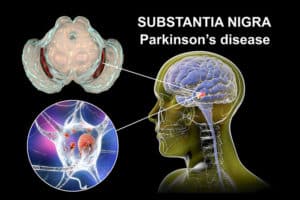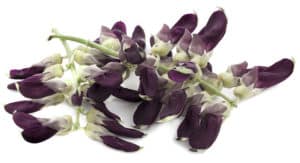Table of Contents
Many are now using natural alternative treatments and dietary supplements to alleviate the symptoms of Parkinson’s Disease. And for prevention of the progression of Parkinson’s.
In this article, we will explore some of the best supplements for treating Parkinson’s Disease, based on scientific research and anecdotal evidence from those who use them. You are unlikely to get this information from your healthcare professional.
Parkinson’s Disease (PD) is a debilitating and progressive brain disorder that affects millions of people worldwide.
The symptoms of Parkinson’s include a variety of problems with movement such as tremors, rigidity, and difficulty with every day things like walking, eating, speaking and sleep.[i]
Other symptoms include cognitive impairment, depression, and anxiety.[ii]
What Parkinson’s looks like in the brain
Decades of imaging studies have shown what happens in the brain of those with Parkinson’s Disease.
 The main problem common to all forms of Parkinson’s is damage to the substantia nigra area of the brain. Showing substantial decreases in the concentration of dopamine neurons.
The main problem common to all forms of Parkinson’s is damage to the substantia nigra area of the brain. Showing substantial decreases in the concentration of dopamine neurons.
A large part of the problem with Parkinson’s is it is often not diagnosed until 70 – 80% of the brain’s dopamine neurons are lost.[iii]
Studies show that the aggregation and misfolding of α-Synuclein plays a critical role in the development of Parkinson’s Disease. And regulation and reduction of α-Synuclein levels may slow its progression.[iv]
Causes of Parkinson’s Disease
The loss of dopamine neurons in Parkinson’s is well known. But more recent research has shown what may be causing this cell death.
Parkinson’s Disease can be caused by exposure to metals, carbon monoxide, solvents, and agricultural and gardening chemicals.[v]
Working with the herbicide paraquat has been shown to increase the chances of developing Parkinson’s by three-fold.
The insecticide rotenone, which is toxic to mitochondria, increases reactive oxygen species (ROS), and reduces the production of adenosine triphosphate (ATP). Contributing to the development Parkinson’s.[vi]
More recently a genetic cause has been discovered that may account for 3 – 5% of all Parkinson’s patients.[vii]
The use of certain drugs, and even other neurodegenerative diseases can lead to Parkinson’s-like symptoms.
Studies have shown the traumatic brain injury (TBI) can increase the risk of developing Parkinson’s Disease. Mild TBI (concussion) increases your risk by 1.5-times, and severe TBI increases your risk by 1.8-times.[viii]
 Natural Remedies for Parkinson’s Disease
Natural Remedies for Parkinson’s Disease
The following are a list of natural nootropic supplements for Parkinson’s with a brief description for each that have been shown to help either avoid, slow down the progression, or to alleviate the symptoms of Parkinson’s Disease.
I do not suggest using all of the nutritional supplements on this list. Instead, click on the link and read the full review for each of the supplements that resonate with you because you unlikely to get these from even a healthy diet.
Follow dosage recommendations and make sure you read the side effects section for each to ensure that supplement is not contraindicated with any med you are currently using.
L-DOPA (Mucuna Pruriens)
 L-DOPA (Mucuna Pruriens extract) – 500 – 1000 mg 3-times per day – is as a natural alternative to Carbidopa (Lodosyn, Sinemet, Atamet) to increase brain dopamine levels and without the side effects associated with Carbidopa – this is a natural precursor to the synthesis of dopamine – I recommend: Cur EASE® L-DOPA 99%
L-DOPA (Mucuna Pruriens extract) – 500 – 1000 mg 3-times per day – is as a natural alternative to Carbidopa (Lodosyn, Sinemet, Atamet) to increase brain dopamine levels and without the side effects associated with Carbidopa – this is a natural precursor to the synthesis of dopamine – I recommend: Cur EASE® L-DOPA 99%
Acetyl L-Carnitine (ALCAR)
Acetyl L-Carnitine (ALCAR) – 500 mg twice per day – helps transport of fatty acids into mitochondria to make adenosine triphosphate (ATP) – a required cofactor for acetylcholine synthesis – boosts brain-derived neurotrophic factor (BDNF) needed for brain cell repair and neurogenesis – a study conducted at the Mount Sinai School of Medicine in New York found that ALCAR has potential in treating the symptoms of Parkinson’s Disease.[ix] By directly affecting mitochondrial respiration and assisting dopamine neurons and the use of dopamine in the brain. – I use and recommend: Performance Lab® Energy which contains 500 mg ALCAR
Ashwagandha
Ashwagandha – 250 – 500 mg per day – helps prevent, and repair damage caused by Alzheimer’s and Parkinson’s[x] – reduces cortisol – helps regenerate axons and dendrites and reconstruct synapses by increasing BDNF – lowers blood sugar – reduces LDL cholesterol – I recommend: Nutricost Ashwagandha Root Extract (as KSM-66®)
Black Seed Oil
Black Seed Oil – 1 teaspoon 3-times per day – studies show Black Seed Oil helps with Alzheimer’s, Parkinson’s,[xi] depression, brain inflammation, epilepsy, reduced blood flow, glial tumors, and traumatic brain injury (TBI)[xii] – I recommend: Amazing Herbs – Black Seed Oil (NOTE: Black Seed Oil tastes particularly nasty. It reminds me of turpentine).
CDP-Choline (Citicoline)
CDP-Choline (Citicoline) – 750 – 1500 mg per day – contributes to the synthesis of phospholipids, which are essential for the assembly and repair of brain cell and mitochondrial membranes – studies have shown using CDP-Choline can help reduce the dose of L-DOPA by 50% without any reduction in symptom control[xiii] – likely because it helps the reuptake of dopamine in synapses and activates the enzyme needed for increased dopamine production – I recommend: Mind Lab Pro® which contains 250 mg Citicoline
CoQ10
CoQ10 – 1200 mg per day – a study at University of California, San Diego showed that CoQ10 can slow the progression of Parkinson’s disease.[xiv] I recommend: Performance Lab® Energy which contains 100 mg MicroActive® Q10
Creatine
Creatine – up to 5 grams per day – used to produce adenosine triphosphate (ATP) synthesized within mitochondria and is critical for maintaining cellular energy levels – has been proven for neuroprotection in a wide range of neurodegenerative diseases. Including Parkinson’s, ALS, Alzheimer’s, and stroke[xv] Note that a 2016 large study showed that if you are using 300 mg or more of caffeine per day you should NOT use Creatine or you will increase the progression of Parkinson’s. – I recommend: Optimum Nutrition Micronized Creatine Monohydrate
Turmeric (Curcumin)
Curcumin – recent research has demonstrated that Curcumin helps prevent the aggregation of α-Synuclein that plays a role in Parkinson’s Disease[xvi] – I use and recommend: Health Thru Nutrition – Curcumin (as BCM-95®) with Carlyle BioPerine to improve absorption
Lion’s Mane Mushroom
Lion’s Mane Mushroom extract – 1,000 mg twice per day – prevents and treats nerve cells that are damaged in the brain. Once past the blood-brain barrier, Lion’s Mane stimulates enzyme production that releases Nerve Growth Factor (NGF). Nerve regeneration helps relieve neurodegenerative disease symptoms such as Parkinson’s Disease. – I use and recommend: Mind Lab Pro® which contains 500 mg Lion’s Main Mushroom extract, or Real Mushrooms – Lion’s Mane (use my discount code for 10% off: Nootropics10)
N-Acetyl L-Cysteine (NAC)
N-Acetyl L-Cysteine (NAC) – 500 mg 3-times per day – NAC has the unique ability to enable dopamine neurons to recover their function including in those dealing with Parkinson’s[xvii] – I use and recommend: Life Extension – NAC
Passionflower
 Passionflower extract 250 mg per day – helps with panic attacks, seizures, headaches, menstrual pain, and Parkinson’s Disease[xviii] – I recommend: Puritans Pride Passionflower extract
Passionflower extract 250 mg per day – helps with panic attacks, seizures, headaches, menstrual pain, and Parkinson’s Disease[xviii] – I recommend: Puritans Pride Passionflower extract
Pine Bark Extract
Pine Bark Extract – 350 mg twice per day – increases cerebral blood flow and reduces oxidative stress and inflammation helping to prevent Parkinson’s Disease and its progression[xix] – I recommend: Mind Lab Pro® which contains 75 mg of Pine Bark Extract (95% proanthocyanidins).
Polygala Tenuifolia
Polygala Tenuifolia – boosts the expression of brain-derived neurotrophic factor (BDNF) and Nerve Growth Factor (NGF) – has also been found to increase dopamine neurons and improve motor impairment in Parkinson’s Disease[xx] – I recommend: Polygala tenuifolia 20:1 Extract Capsules
PQQ
PQQ – 20 mg 3-times per day – prevents the formation of a-synuclein proteins that contribute to the development of Parkinson’s Disease[xxi] – I recommend: Performance Lab® Energy or Doctor’s Best PQQ (with BioPQQ®)
Saffron
Saffron – 88.25 mg per day – some of the symptoms of Parkinson’s Disease originate from under-utilization of dopamine in the substantia nigra area of the brain. Studies show Saffron helps protect the substantia nigra dopamine neurons associated with Parkinson’s[xxii] – I recommend: Double Wood Supplements Saffron
St. John’s wort
St. John’s wort – 300 mg 3-times per day – several studies show that the main active ingredient in this herb lowered substantia nigra DNA fragmentation, and prevented damage of substantia nigra dopamine neurons – and conclude “these findings reveal the beneficial effect of H. perforatum via attenuation of DNA fragmentation, astrogliosis, inflammation, and oxidative stress”[xxiii] – I recommend: Nature’s Way – St. John’s wort (Perika®)
 Sulforaphane
Sulforaphane
Sulforaphane – 35 mg per day – protects against cell degeneration that causes diseases like Parkinson’s and may help reduce its progression. By acting as an antioxidant, anti-inflammatory, and anti-apoptotic (healthy brain cell cycle)[xxiv] – I use and recommend: AVMACOL® (Sulforaphane with Myrosinase)
Taurine
Taurine – 1.000 mg twice per day – is particularly effective for those using levodopa to treat Parkinson’s Disease because the drug depletes natural taurine levels in your body[xxv] – I recommend: Life Extension – Taurine
Valerian
Valerian – 200 – 600 mg before bed – stacked with Lemon Balm for sleep – Valerian is a very potent supplement so be careful with dosage – some say Valerian helps calm the symptoms of Parkinson’s and clinical studies back this up[xxvi] – I recommend: American Standard – Valerian
Vinpocetine
Vinpocetine – 10 mg 3-times per day – please click through to my review of Vinpocetine and scroll down to the section called “Vinpocetine is an anti-inflammatory” because it is too detailed to explain here but is very much worth reading if you are dealing with Parkinson’s Disease[xxvii] – I use and recommend: Life Extension – Vinpocetine
The Synergy of Vitamins C, D, and E with Natural Nootropics
Don’t underestimate the power of these vitamins. Vitamin D deficiency, in particular, has been linked to a higher risk of developing Parkinson’s. And is important for your bone health.
Alzheimer’s disease is associated with a decrease in Vitamin D receptors in the hippocampus. Lack of gene expression from insufficient Vitamin D contributes to Parkinson’s Disease. The only other way to get Vitamin D is from plenty of sunlight exposure every day.
Vitamin C, on the other hand, is known to be an excellent antioxidant supplement that can fight off free radicals, slowing down cell damage. And Vitamin E has also been shown to exert neuroprotective effects.
Antioxidant Supplements
Given the role of oxidative stress in Parkinson’s, antioxidants like CoQ10 can be game-changers. A study even showed that CoQ10 could slow the progression of the disease.
Blood Pressure and Parkinson’s: The Untold Connection
Now, let’s talk about something not many are discussing—blood pressure. Some studies suggest a connection between high blood pressure and the risk of developing Parkinson’s Disease. Monitoring your blood pressure and maintaining it within a healthy range can be another proactive approach with the right combination of natural nootropics.
 Tips and Takeaways
Tips and Takeaways
Parkinson’s Disease is often not diagnosed until the disease is well established. By then the substantia nigra region of the brain has lost 70 – 80% of its dopamine neurons which by then are very difficult to recover.
You may slow the progression of Parkinson’s Disease by using some of the natural nootropic and herbal food supplements detailed above. I highly recommend reading the full linked review for each supplement including how it works, dosage recommendations, side effects, and timing during the day before you begin using the supplement.
And do not discount the importance of healthy Vitamin D levels, Vitamin C, and dietary Vitamin E supplements to your daily routine.
But there are no guarantees that they will work. Success depends on many factors including the progression of the disease, how your body and brain react to these supplements, genetics and more.
However, many with Parkinson’s have experienced a better quality of life when using these supplements.
Get started by choosing from the list of supplements above, do your research including Nootropics Expert®, follow dosage recommendations and timing during the day, and get started.
There is hope for a better life. We know because of the science, and many have reported their own experience that these nootropic supplements can work. Don’t wait and get started today.






Join The Discussion - 40 comments
Park
July 24, 2023
Nootropics that increase GDNF would be appropriate here
David Tomen
July 25, 2023
I have but it was only animal studies that showed they increased Glial cell line-derived neurotrophic factor (GDNF). But they include: Ashwagandha, Curcumin, NAC, Lion’s Mane and Creatine.
Betty
July 18, 2023
Are you suggesting that all of these be taken every day? What about other supplements such as Omega 3, Vitamin D3, Vitamin c, B1, CoQ10, etc. in addition to your list? I have been trying to help my husband with natural supplements instead of a script. He was on carbadopa levadopa and the side affects put him in the hospital. Thank you.
David Tomen
July 19, 2023
The supplements above have been shown to help either avoid, slow down the progression, or to alleviate the symptoms of Parkinson’s Disease. Please read my review for each to see which would help your husband most once you read my research. CoQ10 is on that list.
The one constant which is not likely an option is L-DOPA (Mucuna Pruriens extract) which is at least a 95% L-DOPA extract because that naturally replaces carbidopa but without the side effects of carbidopa.
Everyone, whether you have Parkinson’s or not, should be using 1,000 mg DHA per day, 5 – 10,000 IU Vitamin D3 per day (depending on your labs), and many need a BioActive B-Complex (not just B1).
If I had Parkinson’s I’d be using nearly every supplement on the above list. I don’t but use the majority of them every day anyway.
Thomas
July 8, 2023
Positive testimonials from PD users are so hard to find.
Similar is the status with clinical studies on humans.
I’m using the supplements, believing in them, but honestly, cannot pinpoint to improved symptoms-esp. tremors. Slowing the progression is goal, but hard facts are non-proveable.
David Tomen
July 10, 2023
Thomas, you should be experiencing an improvement in your symptoms. I highly recommend that you change your supplement brands, and make sure you are following dosage recommendations including the correct amount and number of times per day.
If it is not working then you could have bad supplements, are taking the wrong amount and/or not using them often enough every day. This stuff works and I know this because people that I consult with or sometime leave a comment on one of the threads tell me it is working.
Alan J Schunemann
June 24, 2023
Wow, this is an awesome list! I just tried searching for something similar and only came up with Vitamin D, CoQ10, and Fish oil.
David Tomen
June 25, 2023
Alan, these supplements seem to work. I do consultations with those dealing with Parkinson’s which was the inspiration for this article. And the science supports every supplement that I detailed in the article above.
Paula
May 10, 2023
Thank you I just now discovered your articles – my husband was diagnosed with Parkinson’s ( tremors )2020 and he is on 25/100 levadopa. We don’t think it’s doing anything to slow down the progression – What is your suggestion ? Add these supplements – or cut out the levadopa ?thank you so much Paula
David Tomen
May 11, 2023
Paula, I cannot tell you to cut out the levodopa because I am NOT a doctor. Haven’t played one on TV either.
That said, I have several in our community who traded levodopa for these supplements with good success. If you read the details of each supplement above you’ll understand more clearly which are a levodopa alternative, which help avoid Parkinson’s altogether, and which supplements slow the progression of Parkinson’s.
Thomas
May 7, 2023
Thanks. I was looking for the article like this.
I take quite a few supplements from the list.
Beside science, it does wonders for my self-confidence that I’m actively doing something to slow down the desease.
Best regards,
Thomas
Carlo Gambucci
April 25, 2023
Hi David
I’m impressed by the quality of your work. My wife was diagnoses with Parkinsons 5 years ago. We switched to Keto and stopped « hopefully » the progression and improved her health situation. I noticed that we take 9 of your indicated supplements more or less frequently. Your article will help us to have a more methodical approach to the problem.
Thanks for your work
Carlo
David Tomen
April 26, 2023
Carlo, thanks for your feedback. It is deeply appreciated and verification for the motivation to publish this article.
Henry
April 18, 2023
Thanks for the article, I was waiting for an article about this, a lot of people are predisposed to this disease unfortunately, and it is difficult to detect it in the early stages, it is very easy to confuse it with other diseases.
David Tomen
April 18, 2023
Henry you are very welcome. All the other articles out there on supplements for Parkinson’s. I figured we needed something better.